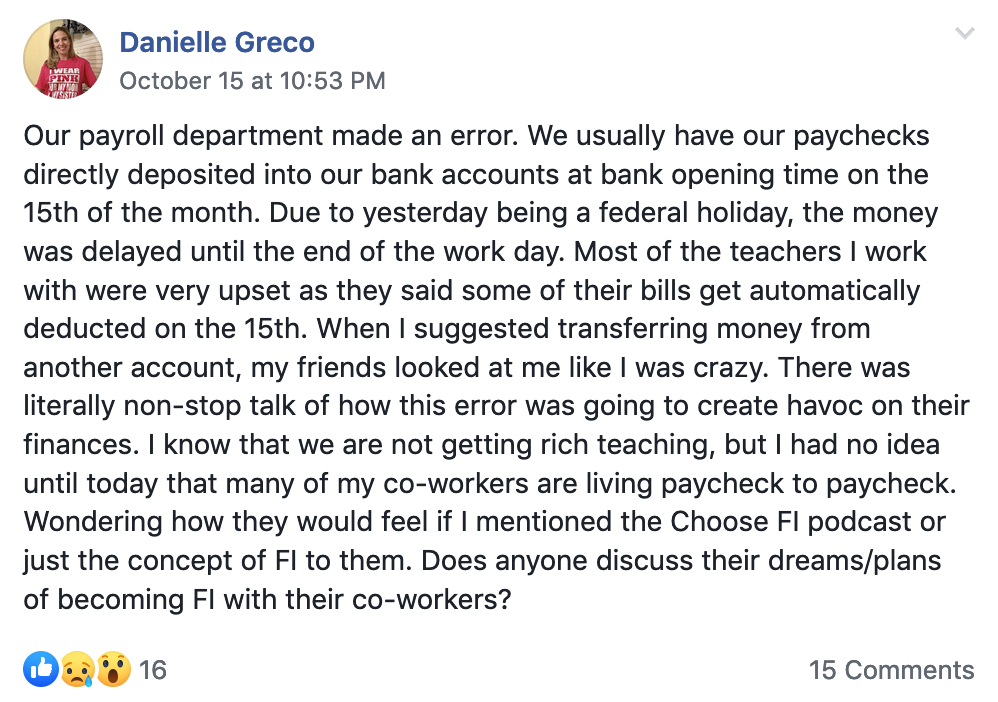By Nate Matherson, Co-founder of LendEDU, a blog that helps consumers learn about personal finance. Nate graduated from college in ’16 with over $55k in student loan debt. In 2020, Nate is working to have repaid all of his student loan debt.
Working as a teacher is a rewarding, important job. You get to shape young minds and spend your days watching students discover new things.
Unfortunately, many teachers have to take out expensive student loans to get the qualifications necessary to excel in this selfless profession. And the salary that teachers make doesn’t always make repaying this educational debt easy.
The good news is, there are options for getting some of your student loans forgiven. In particular, here are four possible ways that teachers could be absolved of the responsibility to pay off at least some of their student loan balance.
>>Related Post: Can You Afford Not To Budget?
1) Public Service Loan Forgiveness
Public Service Loan Forgiveness allows teachers who meet certain qualifying requirements to have their federal student loans forgiven after they’ve made 120 qualifying monthly payments under an income-driven plan.
To be eligible for Public Service Loan Forgiveness, you must:
- Work for a government agency or eligible non-profit
- Work full-time, defined as the greater of working at least 30 hours per week or meeting your employer’s definition of full-time work.
- Have Direct Loans or consolidate other eligible federal loans into a Direct Consolidation Loan
- Make 120 qualifying payments on an income-driven plan.
The Department of Education advises submitting an Employment Certification Form each year, or whenever you change jobs, in order to make certain that you are on track to earn Public Service Loan Forgiveness.
2) Teacher-loan forgiveness
Full-time teachers who work for five complete, consecutive academic years for an educational service agency or for a qualifying low-income school could also become eligible for Teacher Loan Forgiveness. This program allows teachers to have up to $17,500 in Direct or FFEL loans forgiven. Eligibility requirements include:
- Not having an outstanding Direct Loan or Federal Family Education Loan as of October 1, 1998.
- Working as a full-time highly qualified teacher in a qualifying school or educational service agency for five years with at least one year of work occurring after the 1997 to 1998 school year.
The loans being forgiven must have been issued before you completed your five years of qualified teaching. You must also work for a complete academic year in order for that year to count as one of your five qualifying years – unless you fall within certain exceptions.
3) State-based forgiveness programs
Many states provide loan forgiveness programs for teachers who work in high-need areas. You can search the database created by the American Federation of Teachers in order to find out what loan forgiveness options your state offers.
Requirements differ by location. Generally, however, you must work in a low-income area for a minimum time period.
For example, the Illinois Teachers and Child Care Providers Loan Repayment Program offers grants to encourage qualified teachers to work providing early child care or to work in low income areas. Illinois residents with federal student loans are eligible if they work for two consecutive years in a qualifying position. Those who meet eligibility requirements can obtain up to a $5,000 grant to help repay federal loans.
4) Loan forgiveness through income-driven repayment
Teachers may also become eligible for loan forgiveness after making a certain number of payments on an income-driven payment plan. These include:
- Revised Pay As You Earn (REPAYE): This plan caps payments at 10% of discretionary income. Any remaining loan balance is forgiven after 20 years if all loans were obtained for undergraduate education or after 25 years if any loans were taken out to pay for a graduate or professional degree.
- Pay As You earn (PAYE): This plan also caps monthly payments at 10% of discretionary income, but with the maximum payment equal to what you’d owe under a Standard Repayment Plan. Any remaining balance will be forgiven after 20 years.
- Income-Based Repayment (IBR Plan): Payments under this plan are capped at 10% of discretionary income if you’re a new borrower after July 1, 2014 or 15% if you had loans before that date. Payments can’t ever exceed your monthly payment under the 10-year standard repayment plan. Any remaining balance is forgiven after 20 years if you first borrowed after July 1, 2014 or after 25 years if you had loans before that date.
- Income-Contingent Repayment (ICR): Payments are capped at 20% of discretionary income or the amount you’d pay on a 12-year repayment plan with fixed payments adjusted according to income. After 25 years, any balance remaining on your loans will be forgiven.
You can find out specific details about income-driven plans on the website of the Department of Education.
Finding a Loan Forgiveness Program for Teachers
You want to focus on the important work you do as a teacher without worrying about how to repay the loans you needed to become qualified. So make sure to look into all of your options for loan forgiveness as soon as you begin working and repaying your debt.
>> Related Post: Financial Independence On A Teacher’s Salary
You want to sign up for the right repayment plan immediately so any payments you make can count towards Public Service Loan Forgiveness or income-based forgiveness. Talk with your loan servicer if you aren’t certain which option is right for you.




















 Mr. Matt Denure
Mr. Matt Denure
